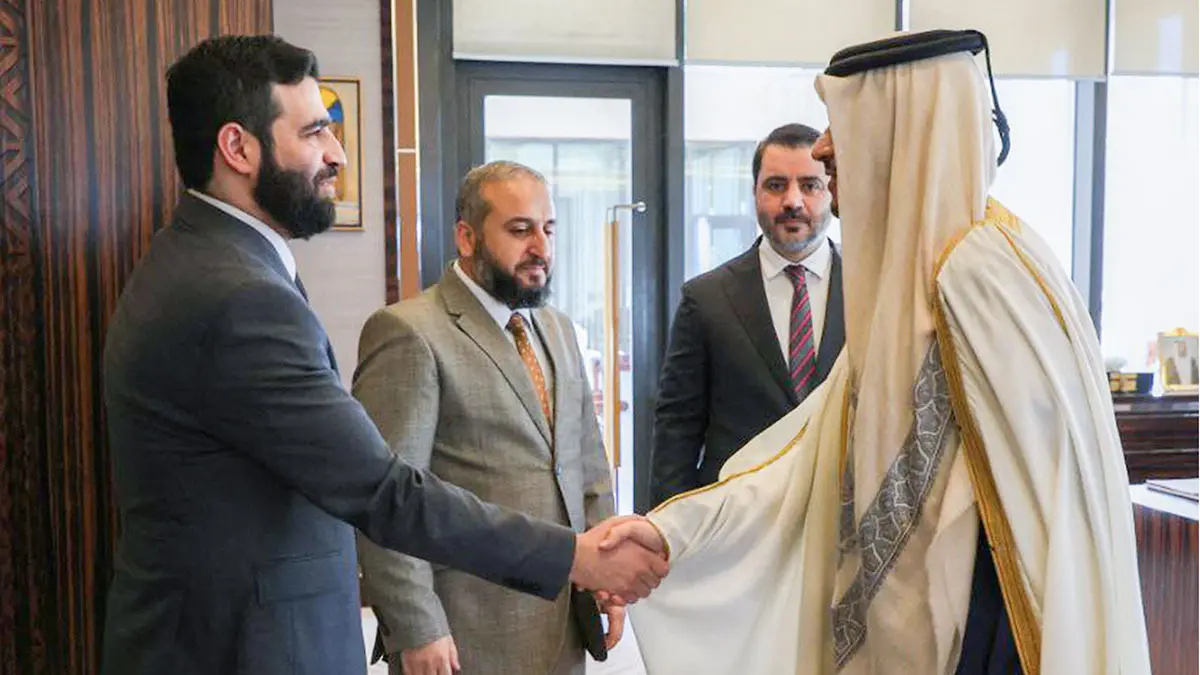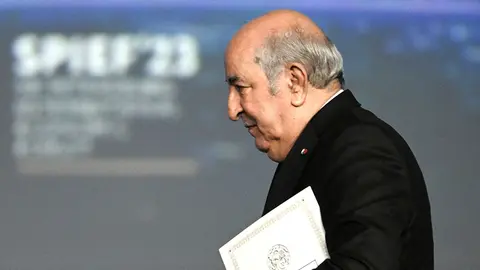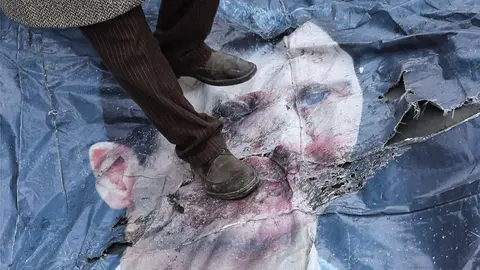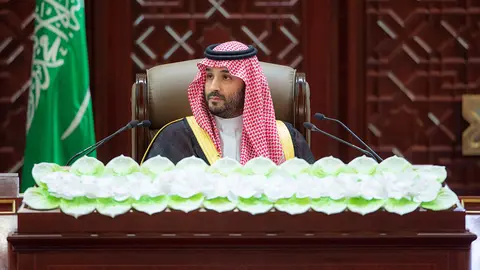The closed road of the ‘Shia Red Crescent’

Iran is unlikely to engage in anything substantial soon. The two protagonists are the new Syrian rulers and the Turkish Qatari alliance. No one knows exactly whether we are now in a state of political limbo or, on the contrary, in a phase of reassessment and weighing of options.
The Palestinians have nothing to offer, neither to their interlocutors nor even to themselves. They are divided into two political blocs: an almost shattered authority in Gaza and another that is adamant about proving its political and moral irrelevance.
Palestinian negotiators are waiting for a sign that the Israelis, the Qataris, the Egyptians, and more than anybody else, the Americans, can tell the different sides that something concrete could still happen.
Take the Israeli position towards all sides. Israel insists on annihilating Hamas and destroying its infrastructure in Gaza. (It would do no less if it had the opportunity in the West Bank).
The Palestinian Authority has let itself become a mere power tool of Abbas. Every day, there is a crisis between the Palestinian street and individuals representing the PA.
No one knows exactly what is required, especially since any Israeli force that sets out to push through a self-declared mission in the West Bank acts without the slightest restraint. “May Allah have mercy” on whomever is killed in the West Bank. Anyone who survives can thank Allah for being spared.
The plan in the face-off between Israel and the Palestinians, including those who pin the blame on Hamas or the PA and those who show more understanding of Israel’s repressive measures, is a zero-sum plan where all is left to circumstances. There is no precise roadmap. It is all random.
When you listen to Hezbollah Secretary-General Naim Qassem talk about the truce between Israel and Lebanon and what lies ahead, you are bound to be shocked. Can anyone explain to us, even out of curiosity, why this war ever took place and why it unfolded with such brutality, killing all these leaders, including even the architect of Hezbollah’s post-1992 re-organisation, Hassan Nasrallah, the leader of “the great victories” and “the catastrophic defeats”, all combined?
The devastation caused by the war is unprecedented, even by the standards of a dilapidated country like Lebanon. Was the goal of the war to make possible this paternalistic moment where the fate of Hezbollah is left in the hands of the Lebanese Parliament Speaker and Amal Movement leader Nabih Berri? And what is the ultimate purpose of all that? To elect a new Lebanese president, for example? Did former Lebanese president Michel Aoun mean anything to begin with, to justify those wars be waged for his sake or the sake of others like him?
Today, Naim Qassem threatens to retake the initiative and strike the Israelis if they do not do this or that. It is amazing how someone can so brazenly defy the facts and the stubborn realities on the ground to paint a false picture of heroics and contrived achievements. The same Naim Qassem who only a few months ago used to brag about Iran and its support, today speaks without making the least threatening mention of Iran and its enmeshed alliances. He no longer uses such slogans as the “unity of the battlefields” and “support for the resistance.” Such slogans would ring hollow today, but for the keenness of the Houthis, who are taking refuge in their remote geography, to prolong the life of such slogans.
The Houthis themselves are a joke. They know that the Israelis are adepts of the policy of “when you strike, you should inflict pain.” We do not believe in the Houthi strategy, if we can call it that, of just standing up and being counted.
The Houthis have abandoned their own wars and engaged in posturing in their surrounding seas in the hope of setting a precedent. We challenge any political analyst to say: “This is what is happening now in Yemen and the next step is this or that.” Nothing is to be expected from any of the protagonists there.
These protagonists are helpless because they are either afraid or exhausted. There is no underestimating the significance of the Assad regime’s collapse nor the way it happened. The worst scenario, for example, would have been for Hezbollah to be subjected to something akin to the massive destruction that befell Hamas. This would have forced it to seek refuge in the “unity of the battlefields,” whether in Syrian town of Qusayr or central Syria or to move to Deir ez-Zor or even to inside Iraq in search of safety under the wings of its ally, the Popular Mobilisation Forces, while awaiting recovery,
No one knows the postal address of former Syrian President Bashar al-Assad, and it is now unlikely that Iran will involve itself in anything of substance soon. Its leadership in Tehran has understood that the fate of the regime itself is at stake.
There is absolutely no trace of “Assad’s Syria,” nor is there any trace of the geography of the Shia Crescent (which we will metaphorically call, considering its rescue capabilities, the “Shia Red Crescent”, the Muslim equivalent of Red Cross, or a rescue mission by definition), a place where the wounded in any confrontation with Israel or the United States could seek a safe haven.
Some scenes are so visually comic they are beyond explanation. For example, what is the significance of a phone call between US Secretary of State Anthony Blinken and Egyptian Foreign Minister Badr Abdelatty? The best thing Blinken could do is to clear his desk and make sure he does not leave any papers lying around for the next US Secretary of State of the Donald Trump administration. As for Abdelatty, the main challenge is to figure out what President Abdel Fattah al-Sisi wants from him amid the huge chaos facing Egypt, a country which has always insisted on leaving things the way they are, if it is not itself directly threatened.
The great United States is a lame duck, as is the case at the end of every presidential term, once every four or eight years. Accordingly, Egypt has elected to limp in synchronicity with the great duck. The passing of former President Jimmy Carter has been a welcome distraction for CNN, Fox, or Al Jazeera English, who now have a funeral, a memorial service, and eulogies to worry about.
The two main players now are the new Syrian rulers and the Turkish Qatari alliance.
Some might say that these are the same, that is, one solitary group or one single alliance not two. The Syrian ruling group is a follower that cannot be compared to the two game instigators, Türkiye, or Qatar.
The Syrians are on a regional tour. In the blink of an eye (compared, for example, to the Iraqi process which took months), the Syrians now have diplomacy, defence and intelligence chiefs, who board private planes and travel with clear instructions from their “leader” who knows what he wants and has the presence and “the stature” that allowed him to decide whether to shake hands or not with the visiting German Foreign Minister a few days ago.
Golani or Sharaa (two names interchangeably used according to the user’s or his satellite channel’s proximity to Turkish Qatari politics) has drawn up a roadmap that with no room for partners. The rising Syrian star left it to a group of young people who had gained their experience on the battlefield and within the premises of Turkish and Qatari intelligence buildings where they have learned how to spend money and when and how to achieve their goals. Sharaa entrusted them with testing the waters of ties with the two most important partners in the region, namely Saudi Arabia and the United Arab Emirates, and tasked them with delivering the rules of engagement to two anxious neighbours, Egypt, and Jordan.
It remains to be seen how things turn out after the Syrian ministers’ regional tour, and what they will have heard at their main destinations (Riyadh and Abu Dhabi) and their subsidiary visit (Doha). The Syrians are not in a hurry to show their cards, nor is the Saudi Emirati camp willing to tell yesterday’s enemies what its red lines are.
The Doha leg in the Syrian ministerial tour serves to do a last-minute check with the Turkish Qatari allies. Once again, no one seems in a hurry, especially since everyone’s eyes are set on the swearing-in ceremony for US President Donald Trump as he leads a staunch US administration in a bid to impose its conditions, regardless of what wishes other protagonists have (except for the Israeli side).
It is left to one’s imagination to guess what is really happening as the “Shia Red Crescent” ambulance stops to load and unload the victims and wounded of the great war which began with the launch of “Al-Aqsa Flood.” Is it political limbo and cautious deliberation, or is it a pause to ascertain the fates of those to be taken away?
Each case will deserve a separate discussion.





